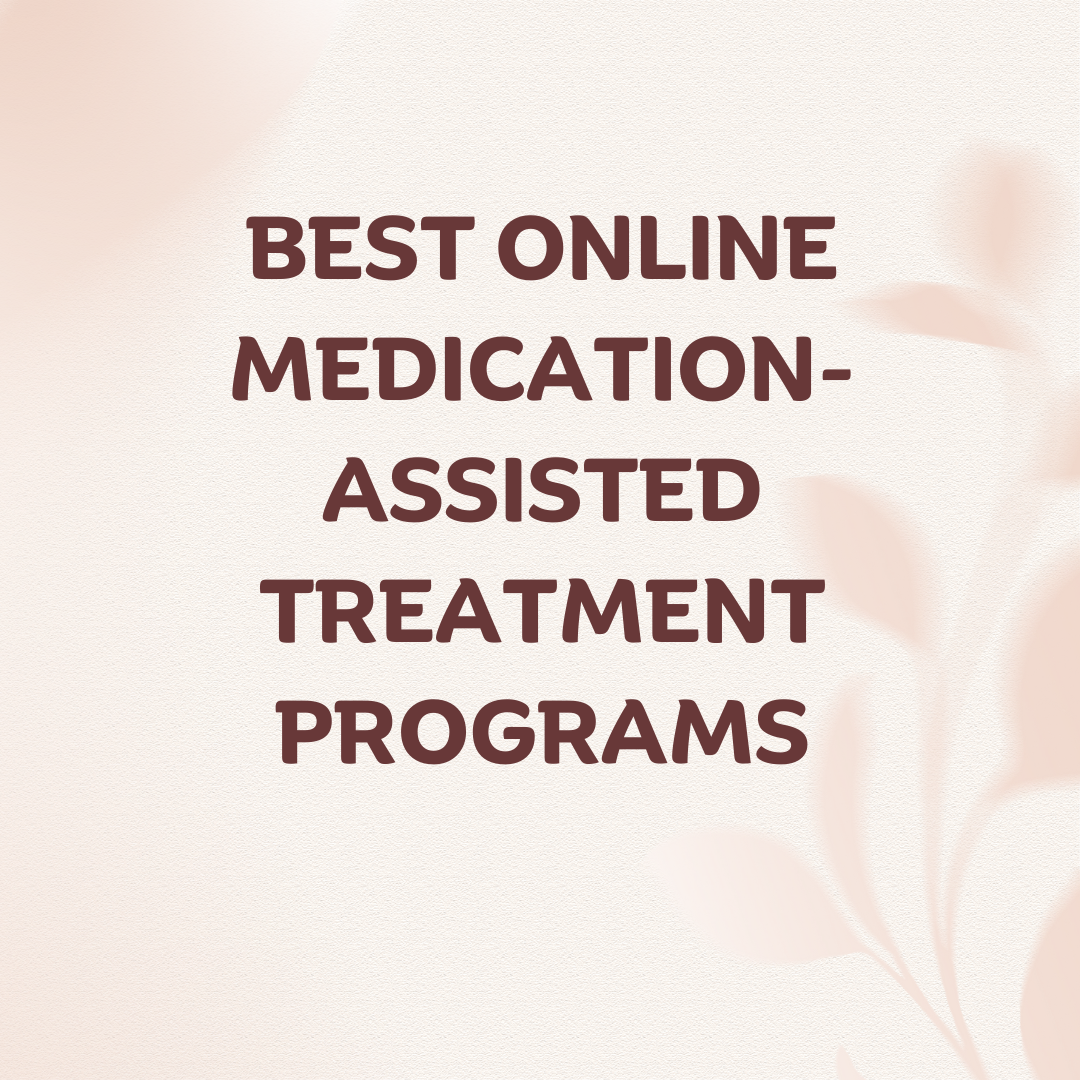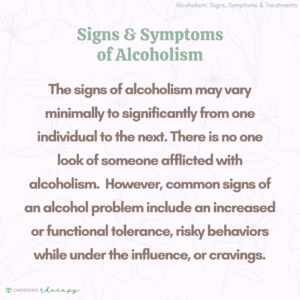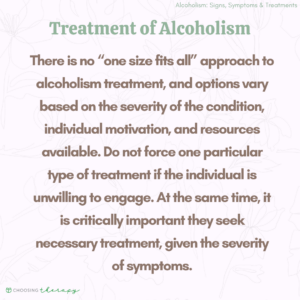Alcoholism, officially known as alcohol use disorder (AUD), is an inability to control drinking due to a physiological, cognitive, and emotional dependence on alcohol. Common symptoms of alcoholism include intense cravings, increased tolerance, and risky behavior. Chronic alcoholism may result in health concerns such as liver and cardiovascular disease.
Ria Health: Effective, Evidence-Based Alcohol Treatment 100% Online Quickly change your relationship to alcohol with our at-home program. On average, Ria Health members reduce their BAC levels by 50% in 3 months in the program. Services are covered by many major health plans. Visit Ria Health
What Is Alcoholism?
Alcoholism or alcohol use disorder (AUD) entails a lack of control over when, where, and why one drinks. Alcohol use becomes abuse when the primary purpose of consumption is to attain a desired level of intoxication.
Diagnostically, alcoholism is conceptualized from mild to moderate to severe depending on the number and severity of symptoms. Given its legality, acceptance, and easy access, alcohol is one substance that can slowly consume someone, and it can rapidly affect relationships and families. There are a lot of myths and misunderstandings around alcohol use and it is important to understand facts about alcohol.
Signs & Symptoms of Alcoholism
The signs and symptoms of alcoholism may vary minimally to significantly from one individual to the next. There is no one look of someone afflicted with alcoholism. While there are stereotypical images of an alcoholic, many are relatively affluent and high-functioning. However, common signs of an alcohol problem include an increased or functional tolerance, risky behaviors while under the influence, or cravings.
Signs and symptoms of alcoholism may include:1
- Being unable to limit the amount of alcohol consumed
- Wanting to cut down on alcohol consumption or making unsuccessful attempts to quit
- Spending a lot of time drinking, getting alcohol, or recovering from alcohol use
- Feeling strong cravings or urges to drink alcohol
- Failing to fulfill obligations at work, school, or home due to repeated alcohol use
- Continuing to drink alcohol despite knowing the risk of physical, social, or interpersonal problems
- Giving up or reducing social and work activities and hobbies
- Using alcohol in dangerous situations, such as when driving or swimming
- Needing increased amounts of alcohol to feel its effect
- Experiencing alcohol withdrawal symptoms when not drinking or drinking to avoid these symptoms
- Trying to find ways to sober up fast or using Google to find tips for preventing hangovers
What Causes Alcoholism?
The causes of alcoholism are unclear, and research continues to struggle insofar as pinpointing an exact causality. However, triggers of alcoholism vary widely in biological, environmental, social, and psychological origin.
Risk factors for alcoholism are not demographic-specific, and anyone at any age may develop AUD. Nevertheless, one who continually and excessively drinks is at potential risk for the disease. The more alcohol one consumes, the more pronounced the physiological changes in the brain and body.
For some individuals, drinking helps them cope with past traumas, social anxiety, or co-occurring mental health conditions. Regardless of possible causes and triggers, the pathway to addiction remains the same.
Common risk factors of alcoholism include but are not limited to:
- Being the child of a parent with AUD or ACoA
- Genetic predisposition
- Steady drinking over time, leading to increased consumption
- Peer group where most or all parties regularly consume alcohol
- Having an undiagnosed or diagnosed mental health disorder
- Low self-concept (i.e., confidence, image, esteem, etc.)
- After experiencing loss or trauma
- Attempting to cut back or abstain from illegal drugs to a legal substance
- Stress due to work, toxic relationships, finances, et cetera.
- Loneliness
- Having a lack of meaning and feeling hopeless or helpless
- Not having better things to do with one’s time
Help for Alcohol Use Ria Health: Effective, Evidence-Based Alcohol Treatment 100% Online Quickly change your relationship to alcohol with our at-home program. On average, Ria Health members reduce their BAC levels by 50% in 3 months in the program. Services are covered by many major health plans. Visit Ria Health Recovery.com – Find the best local detox or rehab center covered by your insurance. Search our unbiased and thorough list of the best mental health and addiction treatment centers. Read reviews. Start Your Search Want to drink less? Sunnyside helps you ease into mindful drinking at your own pace. Think lifestyle change, not a fad diet. Develop new daily routines, so you maintain your new habits for life. Take a 3 Minute Quiz
What Are the Effects of Long-Term Alcohol Use?
Excessive consumption or binge drinking may lead to numerous health complications resulting in illness or even death. Excessive consumption of alcohol during pregnancy may result in pre-and post-natal complications, such as fetal alcohol spectrum disorders (FASDs), premature birth, miscarriage, and stillbirth.
Complications and symptoms of chronic alcohol abuse can lead to end-stage alcoholism, and may present subtly over time or have immediate effects. Alcohol use impacts the brain; for instance, long-term alcohol-misuse can cause brain cell damage and, in extreme cases, can cause Wernicke-Korsakoff syndrome (WKS).2
Other alcohol-related disorders may include liver disease that can become irreversible. Individuals who binge-drink excessively on a single occasion may experience accidental injuries, violent acts, risky sexual behaviors, or alcohol poisoning.3
Health problems associated with chronic alcohol abuse:1
- Liver disease
- Digestive problems
- Heart problems
- Diabetes complications
- Sexual dysfunction and menstruation issues
- Eye problems
- Birth-defects
- Bone damage
- Neurological complications
- Weakened immune system
- Increased risk of cancer
- Medication and alcohol interactions
How Is Alcoholism Diagnosed?
A qualified physician can offer a diagnosis of alcohol use disorder. A professional will look for signs of alcohol dependence or abuse and provide a diagnosis if certain behaviors are evident.
Alcohol consumption becomes essential to survival as the brain transforms from frequent alcohol abuse.4 When the body is dependent on alcohol, individuals who stop or reduce use abruptly may experience withdrawal symptoms, such as tremors, anxiety, insomnia, abnormal heart rhythm, high blood pressure, seizures, and delirium tremens. Severe alcohol withdrawal without appropriate treatment may result in death. Therefore, early intervention for alcoholism is critical.
Want to drink less? – Sunnyside helps you ease into mindful drinking at your own pace. Think lifestyle change, not a fad diet. Develop new daily routines, so you maintain your new habits for life. Take a 3 Minute Quiz.
Treatment for Alcoholism
There is no “one size fits all” approach to alcoholism treatment, and options vary based on the severity of the condition, individual motivation, and resources available. Accordingly, what works for one may not work for others. Do not force one particular type of treatment if the individual is unwilling to engage. At the same time, it is critically important they seek necessary treatment, given the severity of symptoms.
Treatment options for alcohol use disorder may include:
Residential Treatment
Residential treatment entails living in a treatment center, hospital, or sober living community. Generally, residential treatment is for severe cases of alcohol-related impairment. Individuals with alcohol use disorder benefit from 24/7 monitoring and support. Such environments are typically structured and include a team of professionals who provide various forms of counseling, support groups, and medication (if required).
Outpatient Therapy
Chronic alcohol abuse may require inpatient treatment, but outpatient therapy may prove ideal for mild and moderate cases. Such therapy may include counseling visits, intensive outpatient therapy, and partial hospitalization.
Talk Therapy
Many consider cognitive behavior therapy (CBT) the “gold standard” for alcoholism. CBT examines how cognitions (thoughts), personal beliefs, and values impact emotions and behaviors.5 Dialectical behavioral therapy (DBT) is similar to CBT but includes an element of mindfulness, helping individuals stay focused on the present and aware of their internal and external environment.
Medication
Individuals struggling with alcoholism may or may not benefit from medication. Some medications help prevent withdrawal symptoms during detoxification, and others may address associated mental disorders or prevent alcoholic relapse by diminishing cravings or causing aversion to alcohol, such as the Sinclair Method. Taking medications as prescribed is critical to success and health maintenance.
Ria Health: Effective, Evidence-Based Alcohol Treatment 100% Online Quickly change your relationship to alcohol with our at-home program. On average, Ria Health members reduce their BAC levels by 50% in 3 months in the program. Services are covered by many major health plans. Visit Ria Health
How to Get Help for Alcoholism
Research local outpatient therapy providers, inpatient hospitals, or partial hospitalization programs if your loved one struggles with alcohol addiction. Consider if there are any accessible support groups in terms of location and scheduled availability. Your loved one may also benefit from tele-mental health offerings or online support groups. The bottom line is that almost any treatment is more effective than no treatment.
Knowing how to help an alcoholic does make a difference. Utilize encouraging rather than discouraging language. For instance, statements that label one as an “alcoholic” are usually poorly received. Rather than go on the attack, discuss options for support and collaborate on what might work best. Interventions may be necessary but should be considered a last resort. Remember that unless, in the event of a life-threatening emergency or legal mandate, adults must consent to treatment.
Living With Alcoholism
Alcohol use disorder symptoms can pose challenges in your life. Many substance use professionals suggest changing persons, places, and things to maximize the likelihood of long-term success. Distance yourself from others who drink to excess, as alcohol can ruin relationships. Consider avoiding bars or events where you may drink. Remove items from your house that may influence you to fall back into bad habits.
Recovery is an intentional and ongoing process. Alcoholism is a disease that is treatable but has no known cure. Strive toward wellness in a holistic sense, focusing on your emotional, environmental, financial, intellectual, occupational, physical, social, and spiritual health.6 You should consistently practice activities contributing to wellness in each dimension.
Final Thoughts
Chronic alcoholism and abuse can lead to long-lasting health and personal consequences. Should such factors be present, seek support immediately. Groups such as Alcoholics Anonymous (AA) have shown promising results, and you do not have to face alcohol misuse alone. Help is available to aid you in recovery.
To help our readers take the next step in their mental health journey, Choosing Therapy has partnered with leaders in mental health and wellness. Choosing Therapy is compensated for marketing by the companies included below. Alcohol Treatment – Cut Back or Quit Entirely Ria Health – Quickly change your relationship to alcohol with our at-home program. On average, members reduce their BAC levels by 50% in 3 months in the program. Services are covered by many major health plans. Visit Ria Health Drinking Moderation Sunnyside – Want to drink less? Sunnyside helps you ease into mindful drinking at your own pace. Think lifestyle change, not a fad diet. Develop new daily routines, so you maintain your new habits for life. Take a 3 Minute Quiz Detox or Rehab Center Covered by Insurance Recovery.com – Find the best local detox or rehab center covered by your insurance. Search our unbiased and thorough list of the best mental health and addiction treatment centers. Read reviews. Start Your Search Treatment for Mental Health Conditions That Coexist With SUD Talkiatry – Get help from a doctor who can treat the mental health conditions that commonly lead to or coexist with substance use disorders. Take our online assessment and have your first appointment in days. Take Assessment Addiction Newsletter A free newsletter for those impacted by addiction. Get helpful tips and the latest information. Sign UpAdditional Resources
For Further Reading
- Mental Health America – Addiction Screening Tool
- Alcoholics Anonymous
- Hazelden Betty Ford
- Substance Abuse and Mental Health Services Administration (SAMHSA)
- 7 Types of Drunks: How People & Personalities React Differently to Alcohol
- Alcoholic Parents: Impacts on Children & Strategies for Coping
- Journal Prompts for Recovery
- Different Types of Alcoholics & How to Deal With Them
- Bible Verses About Addiction
- Trauma & Addiction: What’s the Connection?
- What the Bible Says About Alcohol
- I Drink Every Night, Am I An Alcoholic?
Best Online Medication-Assisted Treatment Programs Online medication-assisted treatment programs are fairly new to the telehealth industry, but existing companies are expanding quickly with new programs emerging every day. It’s important to explore your options and understand the level of virtual care available so you can choose the best addiction treatment program for you.
Best Mindful Drinking Apps If you’re thinking about joining the sober curious movement and you’d like to cut back on drinking, mindful drinking apps are a great place to start. Practicing mindful drinking can take some time, attention, and patience, but with the help of the right app, you can completely transform your relationship with alcohol.








